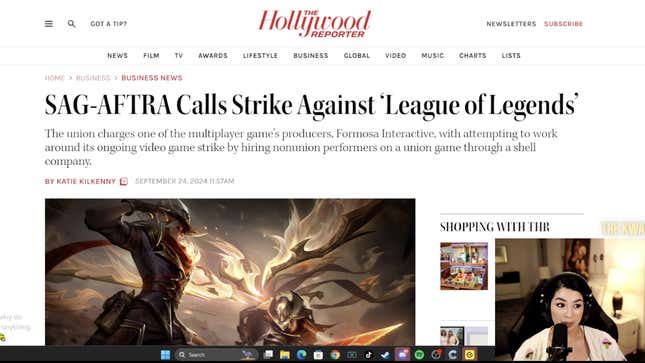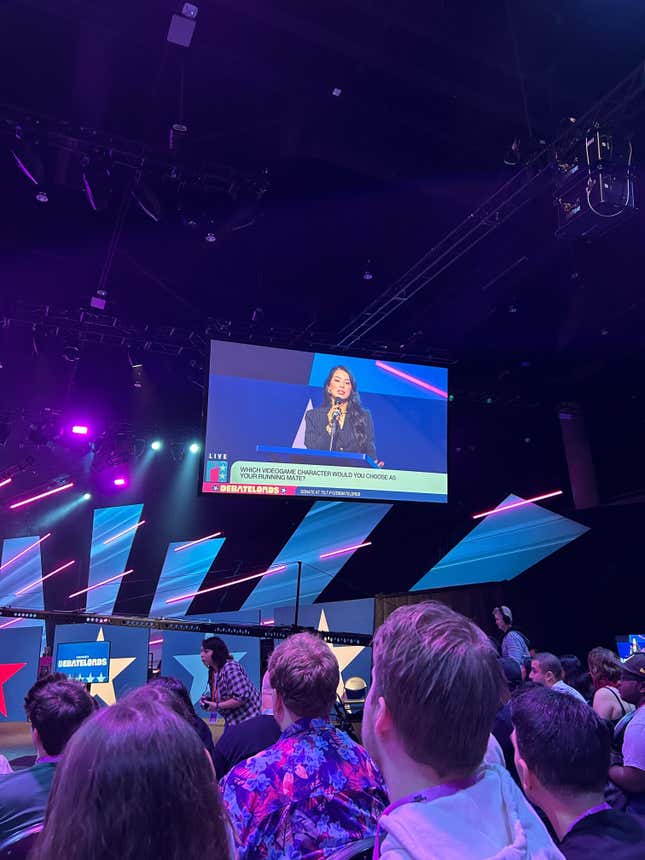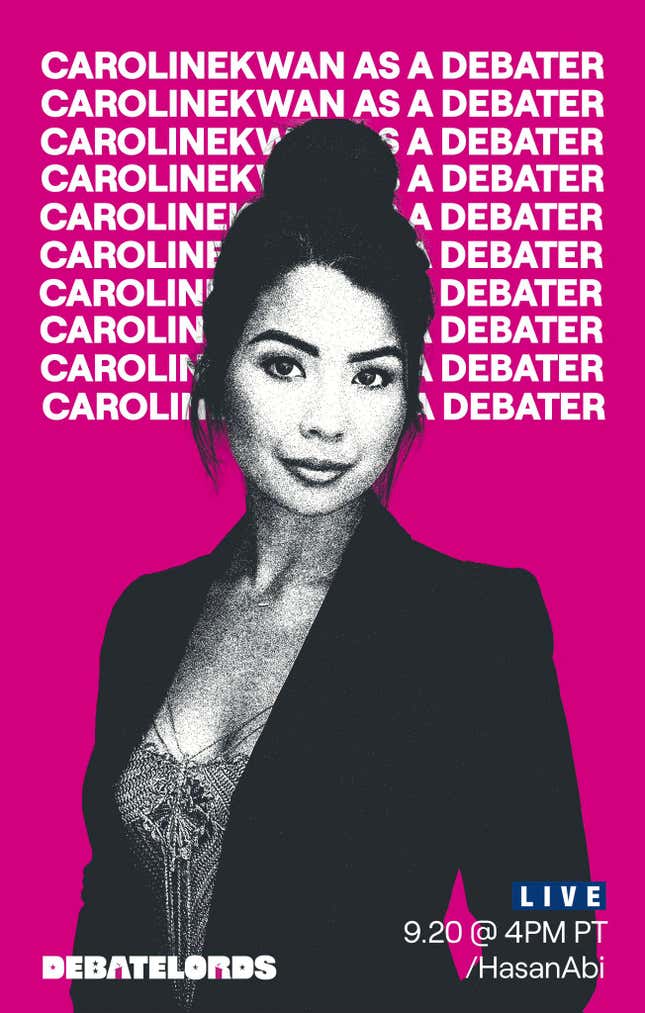Caroline Kwan is tired, but you can’t tell. The political fundraiser-turned-actress-turned-Twitch streamer sits across from me in a TwitchCon conference room on the last day of the convention. Wearing pink overalls and sneakers, her hair combed back from her face, she looks clear and alert.
“This year it was like, oh my God. Day one: Debate leader Rehearsal, getting to know each other, back to Debate leader for the show, followed by a business lunch. “That’s a lot,” she exhales.
“I told my community that I would try to stream on Saturday and I would try to stream on Sunday, and then I realized that I don’t like streaming at TwitchCon,” she admits. Their community is impressive: 134,000 members, all dedicated to Kwan’s more specific streams that combine pop culture and politics with sharp humor and even sharper commentary. Caroline Kwan is a force, both on site and on stream.
The Caroline Kwan Method
Kwan leverages her somewhat unique background on her Twitch streams, covering major pop culture events like the Oscars and Emmys and incorporating political and historical context into her commentary. Although she belongs to the inner circle of streamer royalty such as Hasan “Hasanabi” Piker, AustinShow, QTCinderella and Will Neff (the latter of whom is her partner), Kwan has forged her own path.
“When I started streaming, I didn’t want to be pigeonholed politically because I have a close relationship with Hasan, you know, personally, having known him for a long time and dated Will,” she says. “I don’t want this to be an ‘Oh female Hasan’ thing… I wanted to have something that would do it like no one else does on Twitch, which is why I leaned heavily into pop culture, where pop culture and politics intersect itself.”
This intersection is perfectly summarized in Kwan’s reporting on it 2023 Writers Guild of America hit. “I am a member of SAG [Screen Actors Guild] and WGA, and when the strikes happened, that was my first year of streaming, so I was out there on the picket lines,” she explains. “I reported on it every day and explained to people what the work was all about. I know it’s Hollywood and people think it’s just celebrities who want more money. But most people in these unions are not rich. They probably make about what you make and they can’t afford their health insurance… And they deserve better working conditions, better pay… and that was in my first year of streaming and that was the thing that really helped me to define content.”
Although Kwan’s “bread and butter” is her awards show streams, she still brings political and cultural commentary into her coverage. “I talk a lot about representation, I talk about the impact that films have on society… how after 9/11 there was an influx of even more anti-Muslim depictions – like everyone in the Middle East is terrorists,” she says. “This has an early impact on people in the United States, on how they feel about what their government is doing there. Literally, the Department of Defense has an entertainment bureau that was created after World War II.”
I mention Call of dutyAnd how similar games influence people’s opinions about the Middle East. She nods. “A lot of pop culture is propaganda. Some of it is very subtle. Some of it is not so subtle,” she explains. “So it’s about recognizing when something is propaganda. As I always say, “Look, I’m not saying you can’t enjoy a TV show that’s clearly very pro-cop or anything like that, you just have to recognize that, right?” Just understand if you’re from “Be influenced by popular media.”

The price of being a woman online
Of course, our conversation revolves around the pressures of being a woman in such a male-dominated environment and the kind of negativity she faces just for going live on Twitch.

“Being a woman online, just existing online, puts a target on your back, which is why something like AI deepfakes primarily targets women,” she says, referring to this Twitch deepfake porn scandal of the last year in which a prominent streamer accidentally revealed He watched live manipulated porn with likenesses.
“Here’s just one example of how misogynistic the core of deepfakes is. When I tweeted about it [the scandal] I got DMs and comments saying, ‘You’re next, we’ll pick you up next,'” Kwan explains. “Just because I said, ‘That’s not right.’ Don’t do this. “Women don’t agree with that.” Then I had the lasers put on because it’s about strength. It’s about control. This is what sexual abuse of women is all about. And AI deepfakes are digital sexual abuse.”
For a few minutes, Kwan and I swap horror stories about the DMs and comments we’ve both received and how they’re steeped in the tired misogyny of the internet, GamerGate, and angry young men. “Sometimes someone comes into the chat [to be mean] and I’ll say, ‘Look, if you’re trying to insult me, be creative with it,'” she says as I laugh. “Please don’t just come in and do the same boring crap I’ve heard since elementary school…get some new material.”
I ask her about the added pressure to portray perfection that so many women, queer people, and POC feel in online spaces. She nods emphatically. “As someone who has already struggled with this [perfection] for a long time – I also wonder if that’s just because I’m a half-Asian girl who grew up in a mostly white suburb? That it is deeply rooted in me that you always have to do everything right? Because eyes are always on you, you’re always in the spotlight and you have to be perfect.”
But the fear of not being perfect, which Kwan says she instilled in herself from a young age, isn’t enough to make her stop talking. “I realized pretty early on that I couldn’t help but talk. I need to speak – were you silent or were you silenced? Neither!” We laugh out loud at them Oprah meme reference.

“And then streaming comes into play and it’s live, there’s no editing, it’s real time… and when the attention was on me, I also got the bad attention… and [the bad actors] When you examine everything, they take you out of context and say, ‘Oh, you’re a stupid bitch,'” she says. “It doesn’t matter how much care I put into my streams. It doesn’t matter how openly I speak… I don’t know everything. I make mistakes, we all make mistakes. It’s what you do when you make a mistake that I think gives more insight into who you are as a person.”
She tells me that the younger members of her community have taught her so much and that she always tries to put the focus on marginalized people who are directly affected by the issues she covers on stream. As we near the end of our conversation (which was by far my most insightful conversation of the weekend), we both sigh and realize that we are two women fighting against a seemingly endless current of hate.
“There’s not, there’s not a lot of female streamers doing things like: [political streamer] jeans and I do that with most of our content. And I understand why. “It’s a difficult situation because I wish more women could speak out because there’s power and strength in numbers – there’s every stupid guy out here who would give their opinion on something… and they have a huge one Audience,” Kwan spits. “And when it comes to women, because of the hurdles we face just being online and being public figures, there are a lot of women who have just chosen not to express their opinions – and I understand that fully! It sucks!”
She thinks for a moment, clearly pondering her impact as such a prominent streamer who is neither white nor male.
“I started streaming to create a community, to have a platform to share my voice and advocate for things that I care about and think are important – and to try to be on that platform “To be a good example,” she says, pausing. “On the bright side, despite all the obstacles and challenges we’ve talked about here, I look at my community and see how quickly I’ve grown on Twitch. I’ve been doing this for two years now… And the fact that I have something really great and constantly growing, regardless of the people I’m close with, is a sign that what I have to say and what I saw. What I do on Twitch is well received by people.”
.



